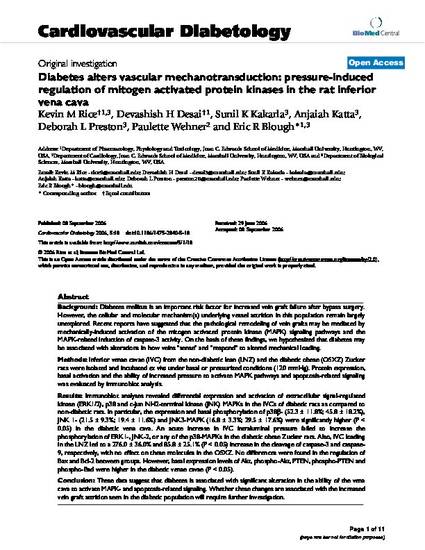
Background
Diabetes mellitus is an important risk factor for increased vein graft failure after bypass surgery. However, the cellular and molecular mechanism(s) underlying vessel attrition in this population remain largely unexplored. Recent reports have suggested that the pathological remodeling of vein grafts may be mediated by mechanically-induced activation of the mitogen activated protein kinase (MAPK) signaling pathways and the MAPK-related induction of caspase-3 activity. On the basis of these findings, we hypothesized that diabetes may be associated with alterations in how veins "sense" and "respond" to altered mechanical loading. Methods
Inferior venae cavae (IVC) from the non-diabetic lean (LNZ) and the diabetic obese (OSXZ) Zucker rats were isolated and incubated ex vivo under basal or pressurized conditions (120 mmHg). Protein expression, basal activation and the ability of increased pressure to activate MAPK pathways and apoptosis-related signaling was evaluated by immunoblot analysis. Results
Immunoblot analyses revealed differential expression and activation of extracellular signal-regulated kinase (ERK1/2), p38 and c-Jun NH2-terminal kinase (JNK) MAPKs in the IVCs of diabetic rats as compared to non-diabetic rats. In particular, the expression and basal phosphorylation of p38β- (52.3 ± 11.8%; 45.8 ± 18.2%), JNK 1- (21.5 ± 9.3%; 19.4 ± 11.6%) and JNK3-MAPK (16.8 ± 3.3%; 29.5 ± 17.6%) were significantly higher (P < 0.05) in the diabetic vena cava. An acute increase in IVC intraluminal pressure failed to increase the phosphorylation of ERK1-, JNK-2, or any of the p38-MAPKs in the diabetic obese Zucker rats. Also, IVC loading in the LNZ led to a 276.0 ± 36.0% and 85.8 ± 25.1% (P < 0.05) increase in the cleavage of caspase-3 and caspase-9, respectively, with no effect on these molecules in the OSXZ. No differences were found in the regulation of Bax and Bcl-2 between groups. However, basal expression levels of Akt, phospho-Akt, PTEN, phospho-PTEN and phospho-Bad were higher in the diabetic venae cavae (P < 0.05). Conclusion
These data suggest that diabetes is associated with significant alteration in the ability of the vena cava to activate MAPK- and apoptosis-related signaling. Whether these changes are associated with the increased vein graft attrition seen in the diabetic population will require further investigation.

© 2006 Rice et al; licensee BioMed Central Ltd.
This is an Open Access article distributed under the terms of the Creative Commons Attribution License (http://creativecommons.org/licenses/by/2.0), which permits unrestricted use, distribution, and reproduction in any medium, provided the original work is properly cited.